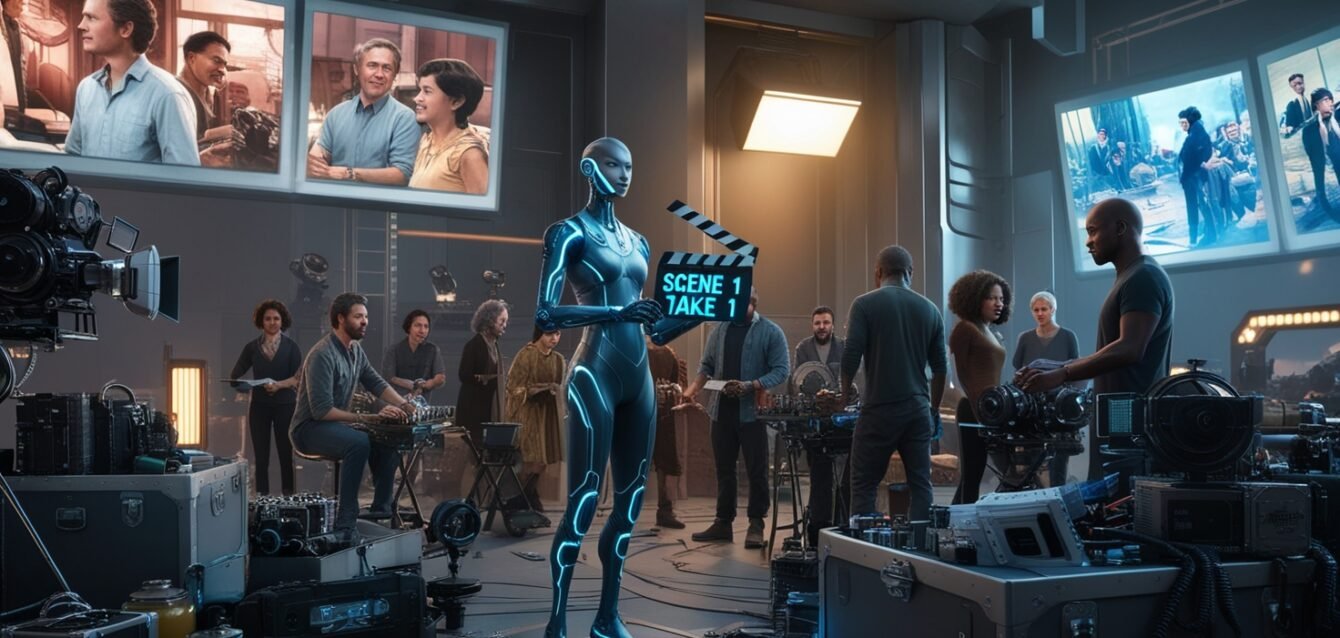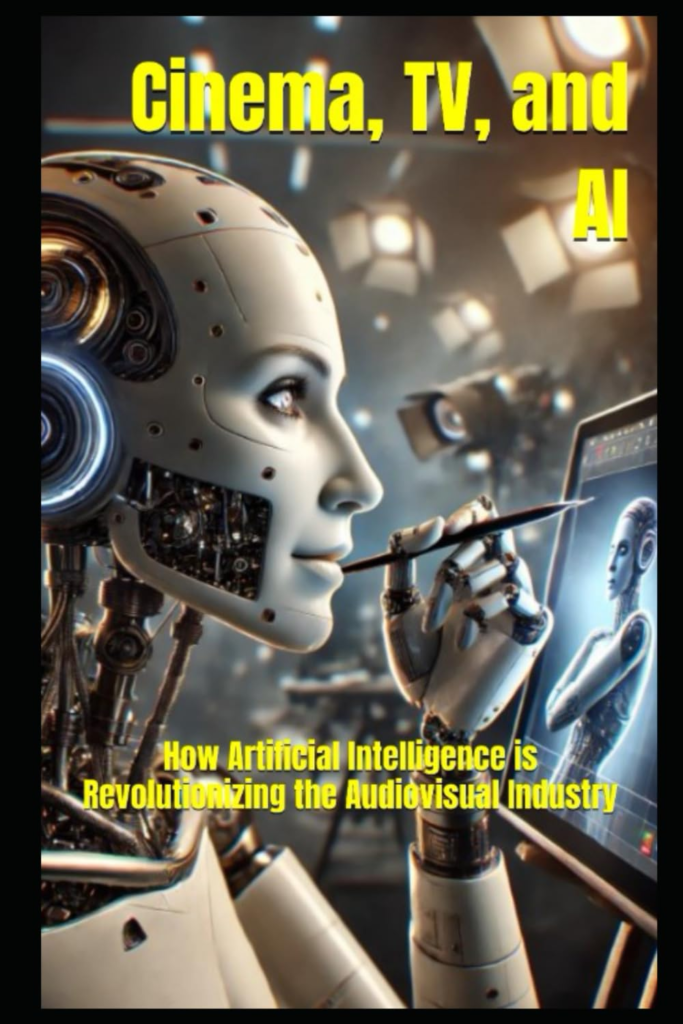AI in Filmmaking
The integration of artificial intelligence (AI) into the film industry represents a transformative change, affecting how movies are developed, produced, and distributed. Over recent years, AI technologies have evolved considerably, moving from rudimentary applications to sophisticated systems that significantly enhance various stages of filmmaking. From pre-production tasks to post-production editing and distribution, AI is being utilized to streamline processes and elevate creativity within the industry.
During the pre-production phase, AI tools assist filmmakers in script analysis and storyboard creation, providing insights that can predict audience reactions and enhance narrative flow. By harnessing big data and predictive analytics, filmmakers can refine their projects to align closer with audience expectations, thus increasing the likelihood of a film’s success. In addition to script development, AI-enriched software helps in identifying ideal shooting locations and casting suggestions based on data-driven assessments of actor suitability and market trends.
Moving into the production stage, AI technologies play a pivotal role in augmenting traditional filming techniques. For instance, automated drones equipped with AI can capture breathtaking aerial shots with precision, negating the need for extensive crew setups. Furthermore, AI-driven cameras can adapt automatically to varying lighting conditions, ensuring high-quality footage without the need for constant human input.
In post-production, AI’s capabilities extend to editing, where machine learning algorithms analyze footage, identifying the best takes and suggesting edits to enhance narrative coherence. This speeds up the editing process and allows filmmakers to focus on the artistic aspects of storytelling. Additionally, AI can assist in visual effects creation, providing tools that help artists add complexity and creativity to their projects with increased efficiency.
As filmmakers continue to embrace artificial intelligence, it stands to reason that AI technologies offer substantial benefits for the industry. By streamlining processes and reinforcing creative efforts, AI aids filmmakers in realizing their artistic visions more effectively than ever before.
(Purchase today by clicking on the image)
Filming Techniques Enhanced by AI
The evolution of artificial intelligence (AI) has introduced transformative changes in the realm of filmmaking, particularly in the techniques employed to capture cinematic scenes. One notable advancement is the integration of AI-driven cameras. These sophisticated devices utilize real-time data to automatically adjust settings such as exposure and focus based on prevailing lighting conditions. This allows filmmakers to maintain optimal image quality without the extensive manual adjustments traditionally required, ultimately expediting the filming process and enhancing visual consistency.
In addition to AI cameras, facial recognition technology presents significant opportunities for the enhancement of actor performances and character portrayals. By analyzing minute facial expressions and emotional cues, this technology provides filmmakers with detailed insights into an actor’s performance, allowing for informed decisions during the editing phase. Such insights can guide directors in refining narratives, ensuring that emotive moments resonate with audiences, thus making character-driven stories more impactful.
Moreover, machine learning algorithms now play an integral role in shot composition. These algorithms analyze vast amounts of historical data including various cinematic styles and audience preferences, assisting creators in determining the most aesthetically pleasing angles, framing, and movement for their scenes. This data-driven approach not only streamlines the decision-making process but also encourages filmmakers to experiment with unconventional techniques, leading to a visually rich storytelling experience that retains audience engagement.
The combination of these advanced AI applications is reshaping traditional filming practices. Filmmakers can now harness the power of technology to push creative boundaries while simultaneously addressing practical challenges. The synergy between AI and filmmaking signals a new era where dynamic and innovative visual storytelling thrives, ultimately enriching the cinematic landscape.
The Role of AI in Visual Effects and Post-Production
Artificial Intelligence (AI) has increasingly become a pivotal force in the realm of visual effects (VFX) and post-production within the film industry. Its ability to analyze vast amounts of data and perform complex computations has led to a remarkable transformation in how filmmakers approach the creation of visual narratives. By implementing AI-driven tools, post-production teams can generate highly realistic visual effects that were previously labor-intensive and time-consuming.
One significant advancement facilitated by AI is the automation of repetitive editing tasks. Traditionally, editors would spend countless hours refining footage and fine-tuning visual elements. However, AI-powered software can now streamline these processes, allowing for quicker edits and enabling creative professionals to allocate more time to artistic decisions. For instance, AI algorithms can analyze video footage to identify and categorize scenes, making the editing process more efficient.
Additionally, AI technology has been instrumental in enhancing the realism of VFX. Machine learning techniques enable the generation of lifelike images and animations by learning from extensive datasets of existing visuals. This has enabled filmmakers to create stunning environments and characters, enhancing audience engagement and immersion in cinematic experiences. Notable films such as “The Irishman,” which employed AI for de-aging actors, showcase how these innovations can reshape storytelling in filmmaking.
Moreover, AI’s influence extends to audience expectations regarding visual quality. As films increasingly incorporate sophisticated visual effects produced through AI applications, viewers have become accustomed to high standards, raising the bar for future productions. This shift highlights the significant role AI plays not just in enhancing technical aspects, but also in shaping the artistic direction of films, ultimately redefining the connection between technology and creativity in cinema.
Balancing Technology and Creativity: Ethical Considerations
The integration of artificial intelligence (AI) into the filmmaking process has sparked considerable discourse regarding its ethical implications and creative challenges. One significant concern is the potential erosion of human artistry. As AI systems become competent in generating scripts, visual effects, and even performances, filmmakers face the unsettling dilemma of relying on technology versus preserving the innate creativity that has defined cinema for generations. This shift could result in a production landscape that is devoid of the emotional touch and nuanced storytelling that only human artists can provide.
Moreover, job displacement within the film industry presents a pressing issue. As AI technologies advance, there are fears that roles traditionally held by writers, editors, and visual effects artists may diminish. This transformation could lead to a loss of employment for many skilled professionals, prompting an industry-wide reevaluation of how creative labor is valued in the age of automation. The challenge lies in finding ways to leverage AI as a collaborative tool rather than a replacement, thereby ensuring that human expertise remains at the heart of cinematic creation.
Ethical responsibilities also come into play as filmmakers navigate the relationship between technology and storytelling. It is essential for creators to consider the implications of their choices when employing AI in the filmmaking process. Transparency regarding AI’s role in the production, as well as the prevention of biased or caricatured representations, is vital to maintaining integrity in storytelling. Additionally, filmmakers must guard against an over-reliance on technology that could dilute the core themes and messages that resonate with audiences.
Ultimately, striking a balance between technological advancements and creative expression is crucial. By embracing AI as a complementary force rather than a hindrance, filmmakers can safeguard the essence of storytelling while innovating for the future. The challenge is to utilize this powerful tool ethically, ensuring that creativity continues to flourish alongside technological progress.
(Purchase today by clicking on the image)






